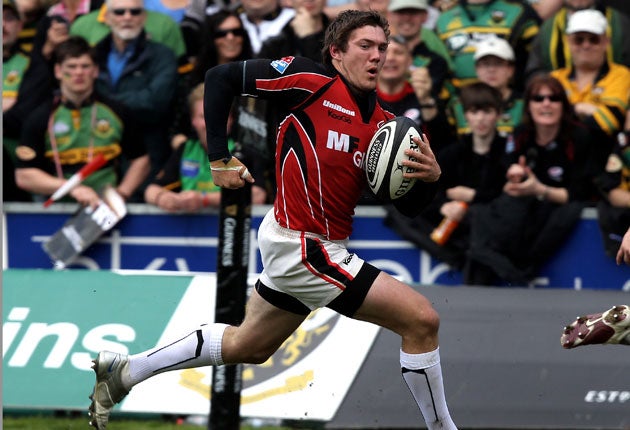Brian Ashton: How Sarries pushed back boundaries by abandoning position
Pause, Engage

Over the course of the season, I've spoken a good deal about the language of rugby and the dangers attached to it – the way it can inhibit, confuse and mislead players and coaches, even those operating at the top end of a sport increasingly in thrall to mantras that either mean very little or send out the wrong message.
Having had my say about "breakdown" and "ball-carrier" and "setting a target", the time has come to address another example of rugby-speak: "field position".
I raise it now because Saracens, who were guilty of playing some pretty unattractive stuff between the start of September and the end of February, have recently done us all a favour by challenging the concept of "field position" as a fundamental principle of successful rugby. At the heart of their Premiership semi-final performance at Northampton last weekend was a total disregard for the orthodox view that teams should only attack from particular areas of the field with a particular kind of possession. They turned away from the god of fear, deciding instead that the ball was there to be used, wherever and whenever it became available.
It goes without saying that this challenging form of rugby requires brave management, committed coaching and a group of players with the mental toughness and the range of skills necessary to deliver it. Saracens are showing all these qualities at the moment. It might not be enough to win them the title – a team as experienced and as bloody-minded as Leicester will take a lot of beating at Twickenham next weekend – but whatever happens in the final, they have provided me and, I suspect, many others with immense enjoyment over the last few weeks.
When we compare this flowering of attacking rugby with the narrowly focused, one-dimensional, depressingly cautious fare on offer before Christmas, the transformation is nothing short of remarkable. It is worth remembering that when the Premiership was at its least inspiring – when Northampton and London Irish were the only lights in the darkness – Saracens were among those worshipping most fervently before the altar of "field position". How many tries were they scoring to win their games? Very few. Penalties were all that seemed to matter.
They were far from alone in this, and the usual excuses were made by all those responsible for the poor standard of rugby: they griped about the laws, the refereeing interpretations, the weather. There was no mention, except in this column, of the negative mindset prevailing at most of England's elite clubs. It was not until November that two sides, New Zealand and Australia, restored some grandeur to the game with their respective victories over France and Wales, reminding us that it is possible to play outstanding rugby whatever laws may be in force at a given moment. Neither the Wallabies nor the All Blacks restricted their options by dividing the field into areas where attack was possible and areas where it wasn't.
Back in the old days, there was no talk of "field position". We spoke of "territory" instead, and the word was effectively shorthand for booting the ball into the furthest corners of the pitch and letting the opposition work out what happened next. The cry of "just kick it, for God's sake" was often heard, often from knackered forwards who considered handling moves from distance to be a mortal sin. Even when the newfangled idea of keeping the ball in hand as far as the halfway line grew popular, it was not exactly a great leap forward. It simply meant that the ball could be kicked further downfield, thereby earning a team more in the way of territorial advantage.
"Territory" became "field position" in the early 2000s and as with many of union's current buzzwords and buzz-phrases, it had its origins in American football, travelling the well-worn route through Australian rugby league and Australia union – the governing hierarchies of the two sports were sharing offices at the time, which must have been entertaining – before finding its way into English league and English union. Gridiron is a demanding game of considerable complexity, but it has a fair bit to answer for on the sporting language front.
All things considered, I'm deeply relieved that a team like Saracens, so conservative a few months ago, are developing a language of their own and moving towards a form of total rugby. They do not throw the ball around for the fun of it: they play a mixed game in which they kick when appropriate, rather than kick automatically. And by playing as they are now, they are achieving results that might have been beyond them earlier in the season. Two victories at Franklin's Gardens and one at Welford Road in their last three outings? This is not fairy-tale rugby we're talking about here. It's winning rugby.
Cautious Exeter may pay penalty
Talking of the obsession with field position, Exeter opted for the traditional route one, forward-based approach in the first leg of their Premiership promotion play-off with Bristol and just about finished on the right side of the scoreline. I didn't expect much else, if I'm honest. I was, however, surprised, by some of the Devon club's decision-making when it came to penalties. Twice, they rejected comfortable three-point kicks and went for driving line-outs instead. Twice, they drew a blank. They will still take a 9-6 lead to the Memorial Ground on Wednesday, but Bristol could easily wipe that out with an early drop goal. A 15-6 advantage would have radically altered the psychology of the tie.
Subscribe to Independent Premium to bookmark this article
Want to bookmark your favourite articles and stories to read or reference later? Start your Independent Premium subscription today.

Join our commenting forum
Join thought-provoking conversations, follow other Independent readers and see their replies